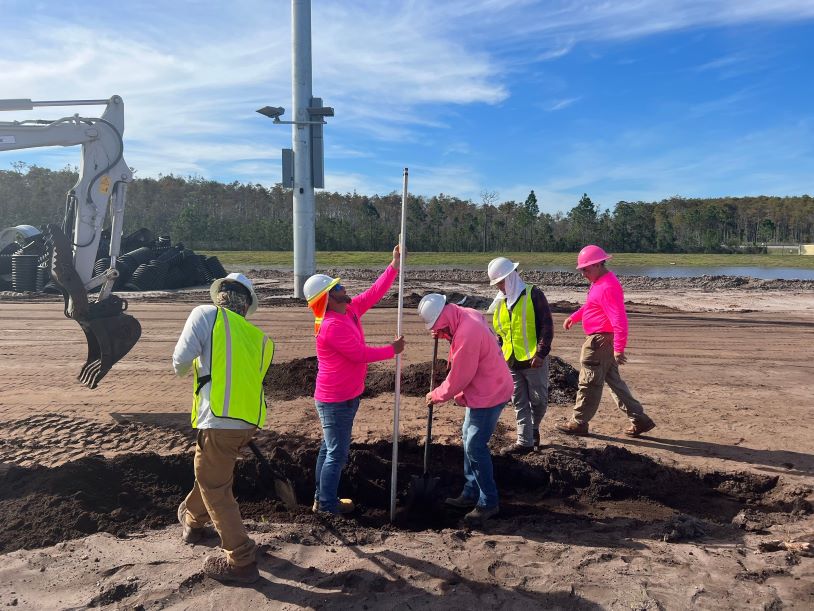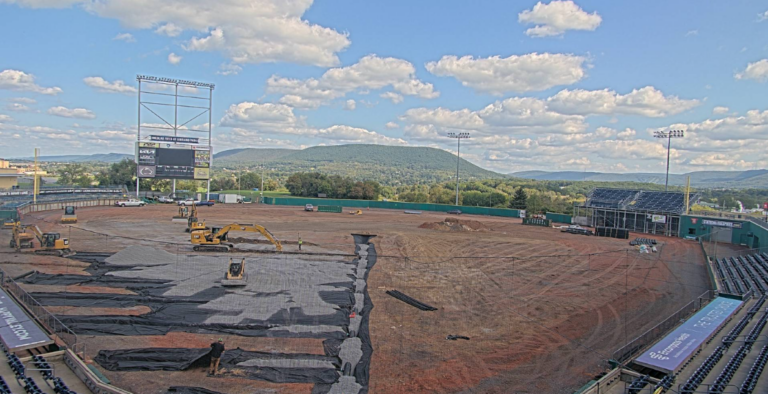By Mary Helen Sprecher
Maybe you have a greater demand for fields thanks to the growth of sports like lacrosse, flag football or even cricket. Perhaps the powers that be have decided to upgrade the playing surface. Maybe some changes such as drainage or irrigation are needed, and you want to make sure they are done correctly. No matter the reason, the upshot is that you need a contractor – and not just any contractor, but one who understands and specializes in sports field construction.
After all, you understand what goes into keeping the field performing at its best, so it’s only natural to expect the same kind of knowledge from the professional who will be building or renovating the field.
Because sports field construction is a highly specialized area, any contractor chosen should be familiar with current products and construction techniques, as well as with the type of surface to be installed and with the standards promulgated by various governing bodies. While the athletes and spectators may see the final product and the playing surface, the construction of the base and drainage beneath the surface may be just as important to the overall system.
In most cases, public projects are bid out, begin with a request for proposal (RFP) or provide a proposal. By crafting the RFP, it is possible to help narrow the field in order to pre-qualify or qualify the sports field contractor. (Note: The intent is not to restrict the number of bidders, but to restrict the number of bidders to only those who are experienced in constructing quality sports field projects and who have the proper equipment, financial stability, insurance and capacity to bond a project.)
Some key pre-qualification documents include the General Services Administration (GSA) Form 527 – Contractor’s Qualifications and Financial Information or the AIA’s form A305 Contractor’s Qualification Statement. Both provide the ability to learn more about prospective bidders, to identify previous projects similar to the planned project and to examine the qualifications of the individuals who would be involved in the project if the company were chosen.
Another means of finding a sports-field-specific contractor is to contact the American Sports Builders Association (ASBA). As the trade association for sports facility builders, designers and suppliers of materials and equipment, ASBA can provide a free online listing of its members, including contractors who specialize in this type of construction (www.sportsbuilders.org, then “Find a Member”).
After winnowing the field of potential contractors down to those who have more experience, the next step in the selection process comes in the form of asking questions. The first involves doing research on previous projects similar to your proposed project. Any contractor should be able to provide references. Find those who own and manage projects similar to yours, and that have been given as references by the companies responding to the RFP. Some key questions include: What was the contractor like to work with overall? Was the job completed on time? Did the job meet expectations? Were there any hidden costs? Was the contractor able to solve any problems arising during construction? Have there been any post-construction problems and if so, has the builder been responsive in addressing them? How does the field look and how does it play?

ASBA offers a voluntary certification program for contractors. In field construction, contractors may earn the designation of Certified Field Builder (CFB) by demonstrating experience in sports field construction, and by successfully passing an exam on key aspects of sports field design and construction. In some cases, contractors choose to pursue certification in specific surfaces; for this reason, ASBA offers certifications programs for CFB-N (for those whose work concentrates in natural grass fields) and CFB-S (for those who specialize in synthetic surfaces.) Another certification which may come into play is that of Certified Track Builder (CTB).
“One important but often overlooked item to consider when you’re looking to build a field and interviewing companies is, first, to ask, ‘Do you have an ASBA Certified Field Builder on staff?’” said Robert J. Cohen, CFB, CTB, of Robert Cohen Co., LLC Sport Surfaces Distributing, Inc., Bernalillo, New Mexico. “Request a list of three to four recent projects with contact names, emails and phone numbers, and contact them for references. The best reference to ask for is one where there was a warranty issue and to find out how it was handled and resolved.”
Field/facility owners also should consider the following: Does the contractor have the necessary insurance and bonding capacity? How many years has the company been in business? If it is a relatively new company, what is the work experience of its principals? How many fields have they built? Were they responsible for the complete project or only specific aspects of the job (surface, drainage, site work, etc.)?
In addition, ask about the contractor’s insurance and whether there have been any major accidents or claims against the builder? Also find out if the company is certified or accredited by, or a member of, a trade organization.

Even if construction materials and methods are identical and items included in the contract are consistent, look beyond price when comparing proposals. Quality construction is a good value for the dollars invested. Choosing on low bid alone is often not cost effective.
Compare proposed construction schedules, progress payments and, of course, guarantees and warranties. Understand what is included in any guarantee (materials, workmanship or both) and for how long.
Rank the proposals and then attempt to negotiate a contract with the first choice builder. While price is not the only consideration, if the bid of the preferred contractor seems high, ask the contractor to review the bid and ask for clarification on the higher figure.
When offering a public bid, it is extremely important to ensure the products to be used and the methods of construction are equivalent to your specifications. Everything specified should be included in the contract price; this might include responsibility for permits, site preparation, electric power, taxes, insurance, removal and replacement of landscaping and restoration of disturbed areas.
Once a contractor has been chosen, confirm the agreement in writing. The contract documents, signed by both the owner and contractor, should be as clear, detailed and as specific as possible. A final set of drawings and specifications accounting for any addendums or negotiated revisions should be referenced in the final contract.
Mary Helen Sprecher wrote this article on behalf of the American Sports Builders Association (ASBA). For more information, visit www.sportsbuilders.org
Note: An essential component of contractor selection should be the decision of how the project is to be bid out and delivered. For discussions of various delivery methods, such as design/build, design/bid/build, negotiated agreement, construction management firm and cooperative purchasing agreements (among others), see “Project Delivery Methods: Know Your Options,” in the May 2024 issue of SportsField Management.


